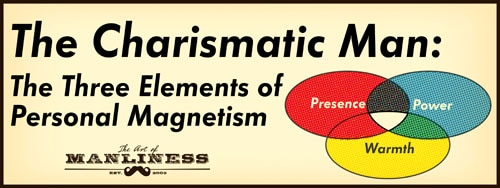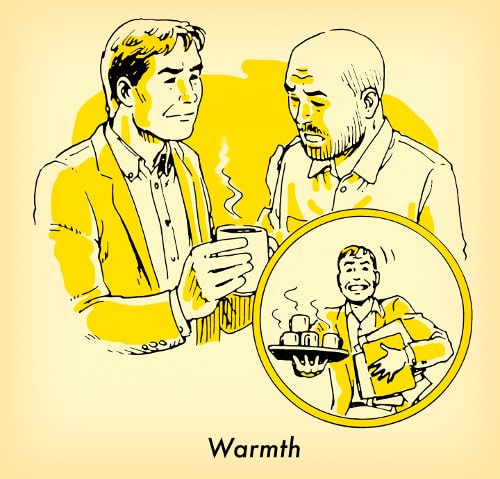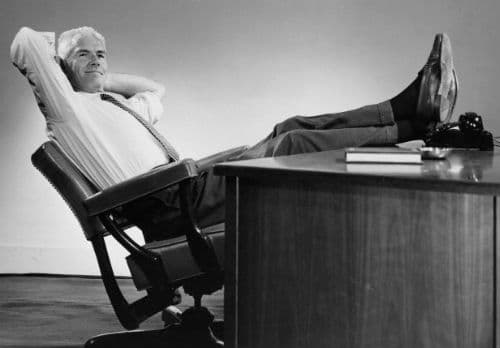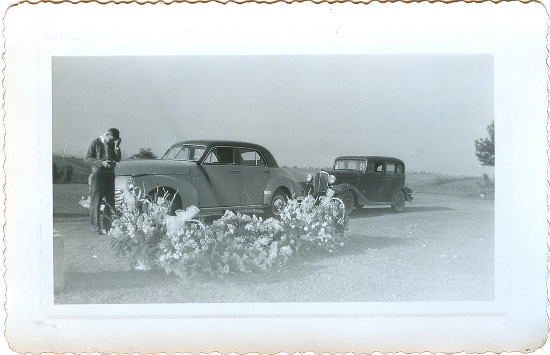
This article series is now available as a professionally formatted, distraction free ebook to read offline at your leisure. Click here to buy.
For the last few weeks we’ve been talking about the three components of personal charisma. First we explored the importance of Presence – giving people your full attention. Then we covered Power – demonstrating confidence that you can affect the world around you. Today we will discuss the last element of magnetism: Warmth.
When you emanate Warmth people see you as being approachable, caring, and empathetic. When they’re around you they feel comfortable and at ease. Warmth fulfills the basic human need to be understood, acknowledged, and taken care of — a need rooted in our very being all the way from childhood. Warmth is your mom handing you a cup of hot chocolate as you come inside from playing in the snow or smoothing your hair and giving you medicine as you lie sick in bed. Warmth is your dad pulling you into a bear hug when you show him the A+ on your test. Even though we grow up, leave the nest, and try to be independent, deep down we all still want to feel cared for, accepted, “at home.”
Just like Power and Presence, Warmth is essential for balancing the other elements and also cannot produce true magnetism on its own. A man with Power but not Warmth will come off as cold, arrogant, and aloof. A man with Warmth but not Power will be perceived as weak, eager to please, and desperate for approval. A drip.
The Real McCoy
Of all the elements of charisma, I think Warmth is the hardest to fake. It’s not too hard to convince people you’re present with them (even when your mind is wandering a bit), nor to act like a guy who’s got it together when you’re really still working towards that goal. But people are pretty good at sniffing out fake Warmth, and in fact have a natural tendency to positively recoil when they think you’re offering the counterfeit variety.
Warmth backfires when people can tell you’re offering it for one reason and one reason only: to get something from them. Hence our distaste for salesmen who lay the Warmth on thick for the sake of trying to close the deal. It’s not that you shouldn’t want things from other people; pretty much the whole point of charisma is to influence others to do something, whether that’s getting them to buy a product, go on a date, or serve a cause with passion. Rather, it’s simply that influencing them can’t be your only motive.
For Warmth to come off as genuine it must be rooted in something deeper than a purely selfish motive. It must spring from your own contentment with life and a real empathy and curiosity about other people. A man of real Warmth enjoys getting to know folks from all walks of life; he conveys the sense that even if he doesn’t get from them what he was looking for, he’d still judge the interaction to have been worthwhile. A man of real Warmth is one who feels that crossing paths with another person is never a true waste.
To be truly effective in creating personal magnetism, the outward behaviors that communicate Warmth to others must arise from that most powerful but ineffable quality: a genuinely good heart. Thus, the foundation for charismatic Warmth begins at your core.
Developing Warmth Within
There are two main ways to develop your inner warmth:
Practice gratitude. A grateful heart is a happy heart. Studies have shown again and again that people who practice gratitude on a daily basis are happier and more optimistic than folks who don’t.
To cultivate your gratitude, make it a practice to write down what you’re grateful for every day. Better yet, use the George Bailey Technique. As you become a more grateful man, your ability to put your problems into perspective will grow, leading to a sense of relaxed contentment that radiates to other people and puts them at ease.
Develop your empathy. Teddy Roosevelt called empathy “fellow-feeling” and argued that it was the most important factor for a healthy political and social life. It’s also an important factor in developing charismatic Warmth. People want to feel understood, and empathy is what allows us to put ourselves in their shoes and feel what they feel.
I’ll admit that developing empathy isn’t easy. You witness forehead-slapping rudeness in public or read the semi-literate vitriol spewed in comments on YouTube and it’s easy to grow pretty cynical about the state of the human race. Here are some ways to soften that cynicism and develop greater empathy for your fellow humans:
- Think of other people as your brothers and sisters. This perspective may be rooted in a religious belief that says we’re all created by the same God, or in science that says we came from one place in Africa, and are even made of the same stardust. Either way, we’re all cosmically connected. Sounds a little cheesy maybe, but thinking that we’re all family members making the same hard journey together has often helped me be more compassionate when I was feeling anything but.
- Interact with people face-to-face. According to studies that have been tracking this since 1979, college students are 40% less empathetic than their counterparts 30 years ago. Why the decline? I would argue it can be traced to the fact that we’re interacting less face-to-face and more as disembodied selves online. Seeing each other’s facial expressions in person is what literally triggers empathy in our brains. In the absence of these cues, we’re more likely to impute nefarious motives to others and feel an unchecked anger towards them. So get out from behind your computer screen more often and interact with people in the real world; as you do so, the general feeling that people are freakin’ terrible that can come from spending time online will often melt into, “Folks ain’t so bad after all.”
- Read more fiction. Studies show that reading fictional literature exercises the mental muscles that strengthen empathy. If you’re looking for ideas on books to read, check out our men’s fiction list.
- Imagine a different story about the people who annoy you. When you cut someone off while driving, you think to yourself, “I hate to have done that but if I don’t get to this interview on time, I won’t get the job.” But when someone else cuts you off, you think, “What a complete asshole.” We chalk our own misbehaviors up to circumstances, but blame the foibles of others on some inherent character flaw. Try offering the same compassion you give yourself to others by imagining possible reasons for why someone else might have done something rude or annoying. In my opinion, the best explanation of this exercise and how transformative it can be was given by author David Foster Wallace in a commencement address. We’ve posted that excerpt in conjunction with this post, and strongly encourage you to take time to read it.
- Be curious about people. You can’t get inside another person’s shoes unless you really get to know them. Ask people clarifying questions so you can figure out where they’re coming from and understand what makes them tick. You can truly learn something about life and the human condition from every single person you meet.
The more you develop your empathy, the more you realize that everybody has hard stuff in their life that they’re grappling with, and the more you’ll want to become an oasis for other people – someone who lightens their burden by making them feel understood, safe, and rejuvenated even in the briefest of interactions.
Conveying Warmth To Others

When you emanate Warmth people see you as being approachable, caring, and empathetic. When they’re around you they feel comfortable, understood, and taken care of. But a man who has Warmth but not Power will seem desperate and too eager to please.
So if Warmth is hard to fake, and must be developed from within, what role do outward behaviors play?
First, it’s possible to have a good heart but be terrible at conveying this kindness to others. You may not even be aware that you’re coming off as aloof to others, since you think of yourself as a good dude. It’s important to not only have inner warmth, but to be able to communicate this warmth to those around you.
Second, acting warm outwardly enhances how warm you feel inwardly. It’s a virtuous cycle: you act warmly towards others, so you feel warm inside, which makes you act more warmly, and so on. In fact, acting warmly will develop your inner warmth more quickly and effectively than thinking your way to empathy ever will. Don’t wait until you feel like an empathetic person before you start acting like it. By acting, you become. Work on both your behavior and mindset at the same time – they go hand in hand.
If you’re worried about coming off as fake by acting warmly before you feel it inside, don’t be. As long as you at least have a good motive for your interactions you’ll be fine. The following behaviors, unless you do them awkwardly or exaggeratedly, are very easy to pull off quite naturally. They’re small ways to simply put your best foot forward with people. And if they do come off as stilted the very first time you try them, well, don’t worry about that either – you’ve got to start somewhere! Once you kick off the virtuous charismatic Warmth cycle, it’s just a matter of time before it registers as wholly genuine.
Think of yourself as the host. When you have people over to your house, what do you do? Hopefully you look for ways to make them feel comfortable in your home. Bring this same mentality to all your interactions. When you think of yourself as the host in every situation, figuring out what to do to put others at ease will come more naturally.
Lead with a sincere compliment. Nothing can strengthen a good relationship or melt the ice in a bad one like a sincere compliment. Sadly, we have a tendency to be pretty stingy with our kindly words. To learn how and why to give an effective compliment, check out the post we wrote last year on the subject. It’s not a bad idea to brush up on how to best accept a compliment, too.
Put more warmth in your voice. Our voice conveys emotion not only through the words we speak, but the tone and pitch we use. We communicate anger with a loud, harsh tone and we communicate kindness and warmth with a softer, richer tone. An easy way to imbue warmth into your voice is to simply smile when you speak. Instantaneous warmth. This tip is especially useful for when you’re talking to someone on the phone. Without body language and facial expressions at your disposal, your voice is your only tool to communicate Warmth.
Mirror their body language. Research has shown that by simply mirroring a person’s body language and manner of speaking, they’ll trust you and find you more attractive. Psychologists speculate that mirroring creates limbic resonance between two individuals, making them more empathetic to one another.
The key to mirroring body language is to not make it too obvious. Don’t match your conversation partner tic for tic, but if they speak softly, bring your own voice down a notch; if they lean back in their chair, lean back just a bit too. Another tactic to make mirroring look less obvious is to let a few seconds lapse before you move into a mirrored position.
Author Olivia Fox Cabane notes in The Charisma Myth that there are instances when mirroring body language can have the opposite effect. The most obvious one is when the other person is angry. Mirroring an angry person’s angry body language and tone of voice will just make them angrier. When you’re dealing with an angry or defensive person, Cabane suggests using a bit of psychological jiu-jitsu to get the person in a state where they’ll be more receptive to your Warmth-inducing techniques:
“Rather than mirroring, try breaking him out of his posture by handing him something: a piece of paper or a pen — whatever works. And then, as soon as he’s in a new position, distract him by giving him new information or changing the subject while you mirror his posture to reestablish rapport.”
Manipulative? I don’t think so. You’re just using solid social skills to get someone in a better frame of mind.
Relax your posture. While an erect posture creates the perception of power and confidence, it can also make you seem stiff, cold, and haughty in certain situations. When you’re trying to create Warmth, relax your posture a bit. Instead of throwing your shoulders back and sticking your chest out, let your shoulders, back, and chest assume a natural, comfortable position. The goal is to look like an affable and approachable everyday-Joe instead of a regal king.
Open up your body. Besides relaxing your posture, using “open body language” will also help you communicate Warmth to others. Instead of crossing your arms across your body, keep them by your side; instead of crossing your legs, leave them open; instead of having a desk or podium between you and the other person, remove barriers. You get the idea.
Give them your “kind” eyes. Kate often describes people as having “kind eyes.” It’s a gaze that some people give that makes others feel warm, accepted, and understood. I had a church leader when I was in high school who had “kind eyes,” and yet the man was a beast. Despite being in his 50s, he could bench 350+ lbs and looked like he could rip your head off. But, he had the kindest eyes. Even when you felt like the world was falling down around you, he’d look at you and you’d instantly feel like everything was going to be okay.
Eyes are the window to your soul, and kind eyes are rooted in the goodness of your heart. But there is also a way to enhance the kindness of your eyes to make sure your inner warmth is shining through.
You do it by switching to a softer focus. Instead of squinting and staring a person down like you’re about to punch them, relax your face and open up your focus. If your face feels relaxed around your eyes, you likely have achieved “kind eyes.”
Smile, damnit. Smiling is an easy way to not only convey Warmth to others, but also feel warm and fuzzy yourself, which helps you in conveying Warmth. The charismatic cycle!
Studies show that smiling, even when you don’t actually feel happy, will instantly make you feel happier. It’s one of those instances when psychology follows physiology. So to help put yourself in a Warmth mindset, go ahead and grin.
Besides making you feel good, your smile makes you more attractive and approachable to others. Research has shown that people who smile more are rated as more attractive than those who don’t. Psychologists and anthropologists also speculate that smiling is a way for us to signify to others that we have good intentions.
Also, as mentioned above, smiling can help you sound warmer. Studies have shown that individuals can discern who is smiling while speaking just by listening to the sound of their voice.
Anticipate needs. Giving someone something they might need without them having to ask shows that you’re thinking about them. “I put together this graph for you. I thought it might be helpful for your presentation tomorrow.” “I knew you’d be up all night studying, so I brought you this pack of 5-hour Energy.” “It’s getting cold out here, would you like to wear my jacket?”
Offer something warm to drink. Warm drinks give people warm feelings – seriously! Take advantage of this psychological quirk by offering people coffee or a mug of hot chocolate to generate Warmth towards you. This may explain why coffee shops are a great place for first dates and business meetings.
Give a good handshake. Touch is one of the best ways we can generate Warmth in another person. You want to respect people’s personal space though, and not touch them a ton right off the bat (the rules are a little different when you’re trying to flirt, but that’s another post). That only really gives you the handshake as a chance to make skin-to-skin contact. So make it a good one!
To give your handshake an extra boost of Warmth, extend your index finger onto the inside of the person’s wrist as you clasp hands. Some communication experts believe that by touching someone’s pulse point as you shake hands, they will feel more connected to you.
Give people a chance to let you know the effort they put into something. Everyone’s got a mini martyr inside. We want people to acknowledge the trouble we went through to do something, but it isn’t polite to detail it. So invite someone to tell you by asking questions that let them talk about it. For example, if someone has flown in to see you, ask things like, “Did you have to wake up really early to catch the flight? Was there a lot of turbulence? Any delays?”
Make them feel comfortable. People are eternally grateful for the person who saves them from standing awkwardly alone. One of the best ways to show warmth is to introduce people to those you are with and invite them into the conversation. Also, be able to carry the burden of a conversation in any situation by becoming a master of small talk. People love having someone over to a gathering who they know will keep the conversation going.
Remember dates, anniversaries, and details. It’s amazing how far simply remembering someone’s birthday will go with people. And I don’t mean simply adding to the herd of well wishes on someone’s Facebook wall. Send a card or even an email – take it as a chance not only to wish them happy birthday but to say hello and ask how they are. Ditto for other anniversaries and milestones.
Another easy way to convey Warmth is by remembering the details – starting with a person’s name (and their kids’ names as well). “How is little Gus? Has he started preschool yet?”
Give thoughtful gifts. No, gift cards don’t count. Doesn’t have to be big stuff – just things that show you pay attention to them. When people mention things they like or are interested in, file these ideas away in your head (or in Evernote!). They’ll be delighted six months later when you say, “I know you mentioned awhile back that you collect vintage men’s magazines. I saw a box full of them when I was at a garage sale and picked it up for you.”
Take care of things. If someone has a problem and you can take care of it for them, do so. If they have a question, but you don’t know the answer, say, “I don’t know, but I’ll find out for you.” If they have a problem you can assist with yourself, lend a hand. “I know you’ve been having problems with the moles in your yard. I’ll come over and set one of my traps and see if we can catch ‘em.”
Remember, conveying Warmth isn’t about being a pushover. But if you have both the time and expertise to take care of something for a friend, do what you can to take at least one thing off his mind.
Ask for help. Ironically, it isn’t just helping others that builds Warmth, but getting helped yourself. When Ben Franklin was a state legislator in Pennsylvania, there was a rival legislator that had badmouthed Franklin in a speech. Franklin understood that if he was to get anything done during his term, he’d have to work with this guy. To get in this grumpy gentleman’s good graces, Franklin did something really counter-intuitive — he asked his rival for a favor.
Franklin recounts what happened in his autobiography:
“Having heard that he had in his library a certain very scarce and curious book, I wrote a note to him, expressing my desire of perusing that book, and requesting he would do me the favor of lending it to me for a few days. He sent it immediately, and I returned it in about a week with another note, expressing strongly my sense of the favor. When we next met in the House, he spoke to me (which he had never done before), and with great civility; and he ever after manifested a readiness to serve me on all occasions, so that we became great friends, and our friendship continued to his death.”
From this experience, Franklin coined the maxim: “He that has once done you a Kindness will be more ready to do you another, than he whom you yourself have obliged.”
Franklin had unwittingly discovered the psychological power of cognitive dissonance to change people’s minds. Our brains don’t like disagreement between our actions and beliefs. If we do a favor for somebody we don’t particularly like, it creates “dissonance” in our brain. To counteract that, our brain shifts our attitude towards the person we dislike. “Hmmm… I did something nice for this guy. I guess I do like him.”
If you want folks to have warm feelings towards you, use the Ben Franklin Effect. Ask for a small favor and reap charismatic Warmth.
Be liberal with the thank you note. It’s possible to convey Warmth even when you’re not around someone, and sending a thank you note is one of the best ways to do that. There’s never a bad time to write a thank you note. They tell people you noticed and took the time to acknowledge something worthy they did or are. Write them by hand and follow this guide. Warmth in an envelope.
Charisma Series Conclusion
We hope you enjoyed this series on how to develop personal charisma. Charisma isn’t something you’re born with – it’s something you work to cultivate — and we hope we have provided you with the tools to do so. You’ll need to practice the recommended behaviors until they become natural. As you do so, you will learn how to balance and mix the three elements to produce the most magnetic effect possible.
Charisma is a neutral trait – it can be used for either good or ill. Use yours both for enjoyment – for drawing people to you when you enter a party and for making friends — and for worthy endeavors as well, like getting people to sign on to fight in a worthy cause. Both professionally and socially, charisma can open many doors for you that might have been otherwise closed.
If there’s one thing to take away from this series, it’s the importance of the “act-to-become” principle. Our modern culture is often obsessed with the idea of “authenticity” (even though when pressed, they’re probably not sure what it means), and the idea of acting in a way you might not really be feeling is criticized as fake or manipulative. But the best way to change your feelings is to first change your behavior – and this is even true for manhood. I came across a great quote from W.H. Auden on this subject just last week:
“Human beings are by nature actors, who cannot become something until first they have pretended to be it. They are therefore not to be divided into the hypocritical and the sincere, but into the sane, who know they are acting, and the mad who do not.”
Men who intentionally cultivate their charisma are not fake nor manipulative, just realistic. Doing whatever comes naturally is given a lot of lip service these days, but it won’t actually get you far in life — always seeking to intentionally put your best foot forward will.
Tomorrow we’ll offer a little addendum to this series – providing a case study from the novel Tender Is the Night in what charisma looks like when all its elements are masterfully combined. So stay tuned for that. And we’ll revisit some different aspects of charisma in the future. Until then, stay man-netic.
Listen to my podcast with Olivia Fox Cabane about charisma:
Read the Entire Series
The 3 Elements of Charisma: Presence
The 3 Elements of Charisma: Power
A Case Study in Charisma From Tender Is the Night
Podcast: The Charisma Myth With Olivia Fox






